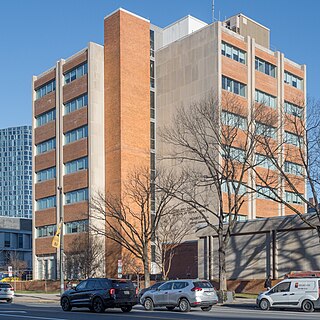Related Research Articles

Chlorpyrifos (CPS),also known as chlorpyrifos ethyl,is an organophosphate pesticide that has been used on crops,and animals in buildings,and in other settings,to kill several pests,including insects and worms. It acts on the nervous systems of insects by inhibiting the acetylcholinesterase enzyme. Chlorpyrifos was patented in 1966 by Dow Chemical Company.

The Yale School of Public Health (YSPH) was founded in 1915 by Charles-Edward Amory Winslow and is one of the oldest public health masters programs in the United States. YSPH is both a department within the school of medicine as well as an independent,CEPH-certified school of public health.

WE ACT for Environmental Justice is a nonprofit environmental justice organization based in Harlem,Manhattan,New York City. The organization was founded in March 1988 to mobilize community opposition to the city's operation of the North River Sewage Treatment Plant,and the siting of the sixth bus depot in Northern Manhattan.
The Joseph L. Mailman School of Public Health is the public health graduate school of Columbia University. Located on the Columbia University Irving Medical Center campus in the Washington Heights neighborhood of Manhattan,New York City,the school is accredited by the Council on Education for Public Health.

The Drexel University Dornsife School of Public Health is a part of the Drexel University Health Sciences network of schools. The Dornsife School of Public Health was located in downtown Philadelphia from its inception until December 2013. It has since re-located to the University City Campus.

Health effects of pesticides may be acute or delayed in those who are exposed. Acute effects can include pesticide poisoning,which may be a medical emergency. Strong evidence exists for other,long-term negative health outcomes from pesticide exposure including birth defects,fetal death,neurodevelopmental disorder,cancer,and neurologic illness including Parkinson's disease. Toxicity of pesticides depend on the type of chemical,route of exposure,dosage,and timing of exposure.
Craig J. Newschaffer is the founding director of Drexel University's AJ Drexel Autism Institute,as well as a professor of epidemiology at the Drexel University School of Public Health and a professor of psychology at Drexel University College of Medicine.

Michael B. Bracken is an American perinatal epidemiologist. He is the Susan Dwight Bliss Professor of Epidemiology at the Yale School of Public Health,and Professor of Obstetrics,Gynecology and Reproductive Sciences,and Professor of Neurology at the Yale School of Medicine. He is co-director of the Yale Center for Perinatal,Pediatric and Environmental Epidemiology.
Elizabeth Anne (Lianne) Sheppard is an American statistician. She specializes in biostatistics and environmental statistics,and in particular in the effects of air quality on health. She is a Professor of Environmental and Occupational Health Sciences and a Professor of Biostatistics in the University of Washington School of Public Health. In 2021,Dr. Sheppard was named to the Rohm &Haas Endowed Professorship of Public Health Sciences.
Frederica Perera is an American environmental health scientist and the founder of the Columbia Center for Children's Environmental Health at the Columbia University Mailman School of Public Health. Her research career has focused on identifying and preventing harm to children from prenatal and early childhood exposure to environmental chemicals and pollutants. She is internationally recognized for pioneering the field of molecular epidemiology,incorporating molecular techniques into epidemiological studies to measure biologic doses,preclinical responses and susceptibility to toxic exposure.
Ana Victoria Diez-Roux is the former dean of the Dornsife School of Public Health and Distinguished University Professor of epidemiology at Drexel University. Her research focuses on the social determinants of health,and the impacts of neighborhoods on health.
Brisa N. Sánchez is a Mexican-American biostatistician and environmental epidemiologist,whose research has included work on the spatial analysis of fast food restaurants,on nutrition in schools,on the relation between the characteristics of neighborhoods and the health of their residents,on the water infrastructure in Mexico City,and on latent variable models in environmental statistics. She is the Dornsife Professor of Biostatistics at Drexel University.
Leslie Ain McClure is an American biostatistician. She is a Full professor of biostatistics at the Drexel University School of Public Health and was the inaugural Associate Director of Diversity for the Statistical and Applied Mathematical Sciences Institute (2017–18).
Katherine Margaret Keyes is an American epidemiologist. She is a professor of epidemiology at the Columbia University Mailman School of Public Health. Her research focuses on psychiatric and substance use epidemiology across the lifecourse,including early origins of child and adult health and cross-generational cohort effects on substance use,mental health,and injury outcomes including suicide and overdose.
Dustin Troy Duncan is an American public health researcher who is an Associate Dean for Health Equity Research at Columbia University Mailman School of Public Health. Their research considers how environmental factors influence population health and health disparities. In particular,Duncan has focused on the health of sexual minority men and transgender women of color in New York City and the Deep South. Duncan serves as Founder of the Dustin Duncan Research Foundation.

Stephanie J. London is an American epidemiologist and physician-scientist specializing in environmental health,respiratory diseases,and genetic susceptibility. She is the deputy chief of the epidemiology branch at the National Institute of Environmental Health Sciences.
Scarlett Bellamy is an American public health researcher who is a Professor of the Department of Epidemiology and Biostatistics at Drexel University. At Drexel she is Associate Dean of Diversity,Inclusion and Faculty Development.

Andrea Baccarelli is an Italian American epigeneticist and clinical endocrinologist,best known for his academic contributions in the field of epigenetics,mitochondriomics,and computational epigenomics,with a research focus on investigating the impact of environmental exposures on human health. He currently serves as Dean of the Faculty at the Harvard T. H. Chan School of Public Health.

Stella Koutros is an American cancer epidemiologist who researches the occupational exposures as risk factors for cancer. She is an investigator in the occupational and environmental epidemiology branch at the National Cancer Institute.

Andrea Martine 't Mannetje was a New Zealand epidemiologist,and was a full professor at Massey University. She specialised in occupational causes of cancer,but also worked on environmental causes of neurodegenerative diseases,birth defects,and inflammatory bowel disease.
References
- 1 2 3 "Gina S. Lovasi, PhD, MPH CV". drexel.edu. Retrieved January 21, 2021.
- ↑ "Gina Lovasi, PhD, MPH". drexel.edu. Retrieved January 21, 2021.
- ↑ "Gina Lovasi, Ph.D., M.P.H: RWJF Health & Society Scholar". healthandsocietyscholars.org. Retrieved January 21, 2021.
- ↑ Harding, Anne (May 9, 2008). "Tree-lined streets may cut city kids' asthma risk". reuters.com. Reuters . Retrieved January 22, 2021.
- ↑ "Urban Forestry project wins ATS Bates award". beh.columbia.edu. May 22, 2012. Retrieved January 22, 2021.
- ↑ "2009 ATS Travel Award Recipients". thoracic.org. 2009. Retrieved January 21, 2021.
- ↑ "Gina Lovasi, PhD". ccceh.org. Columbia Center for Children's Environmental Health. Retrieved January 22, 2021.
- ↑ "Pesticide Chlorpyrifos Is Linked to Childhood Developmental Delays". publichealth.columbia.edu. March 22, 2010. Retrieved January 22, 2021.
- ↑ "New Summer Institute In Epidemiology At Columbia Proves Successful In Its First Year". epimonitor.net. 2012. Retrieved January 22, 2021.
- ↑ "2013-2014 Recipients". publichealth.columbia.edu. 30 April 2015. Retrieved January 22, 2021.
- ↑ "Columbia Team Named Charter Members of First AIA Design and Health Research Consortium". publichealth.columbia.edu. December 17, 2014. Retrieved January 22, 2021.
- ↑ "Neighborhood Park Features Associated with BMI". publichealth.columbia.edu. August 7, 2014. Retrieved January 22, 2021.
- ↑ "Evidence Based Investment in Public Spaces". beh.columbia.edu. March 4, 2015. Retrieved January 22, 2021.
- ↑ "2015 Faculty Grants". publichealth.columbia.edu. 22 March 2016. Retrieved January 22, 2021.
- ↑ "Drexel Researchers Find Factors to Increasing Physical Activity and Park Use". aspph.org. February 14, 2019. Retrieved January 22, 2021.
- ↑ "URBAN PUBLIC HEALTH: A RESEARCH TOOLKIT FOR PRACTICE AND IMPACT". drexel.edu. September 8, 2020. Retrieved January 22, 2021.